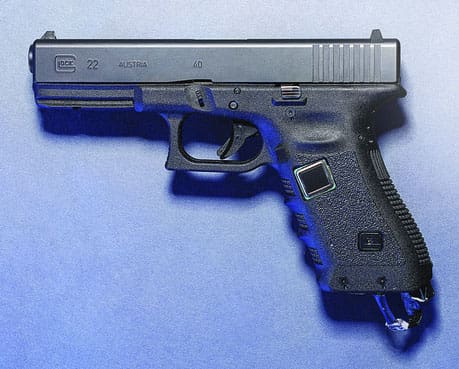We noted Ron Conway’s desire to find the “Mark Zuckerberg of guns” a couple of years ago. His Smart Tech Challenges Foundation had just given young Kai Kloepfer a hefty check to get his fingerprint-enabled ‘smart gun’ off the drawing board. Well as the Wall Street Journal reports today, the kid and Conway think they’ve got something that works.
Kloepfer has spent the past four years designing a handgun with a fingerprint reader built into the grip, and he deferred his acceptance to MIT after winning a grant from the Smart Tech Challenges Foundation in 2014. His startup, Biofire, is just a few months from a live-firing prototype, which, assuming it works, will be the first gun to unlock like an iPhone.
Conway is nothing if not confident.
“Congratulations,” Conway says to Kloepfer. “You are going to save America. You are going to save lives. The gun companies won’t tell you, but the tech industry will.”
Mind-blowing hyperbole aside, good for the kid. He’s obviously invested a lot of blood, sweat, and tears — not to mention cash from an IndieGoGo campaign — into his meisterwerk. As opposed to a variety of earlier failed ‘smart gun’ ventures, who knows? Cribbing iPhone fingerprint technology and adding it to a GLOCK may be enough to interest some of today’s consumers who otherwise wouldn’t want a gun in the house.
Compared with past smart-gun designs, what Biofire gets right is technology that’s almost invisible to the user; anyone who knows how to fire a handgun and unlock an iPhone needs no special instruction. When you pick up the Biofire gun, it wakes up from a low-power mode and activates the microprocessor and sensor. Processing your print requires roughly a second and a half; Kloepfer says he can get the delay down to less than half a second with more work on the software. Assuming your fingerprint is a match, the circuitry releases an internal trigger lock. As long as your middle finger remains in place, the pistol is ready to fire.
Forget for now the gun’s electronics, its reliability, its battery life, and the delay in activation. All of those, uh, features are important (frequently disqualifying) considerations to most gun owners. But for now, they’re still beside the point. There’s still one gigantic elephant stomping around the room that Kloepfer can’t design around and that Conway conveniently doesn’t seem to mention (although the WSJ does). That’s New Jersey’s ‘smart gun’ mandate law.
These false starts have complicated smart-gun politics. In 2002, New Jersey passed the Childproof Handgun Law, which mandated that all handguns sold in the state be smart guns—once the technology was approved by the state’s attorney general. Gun rights activists, fearing new designs would bring the law into effect, threatened boycotts to discourage research by gun manufacturers. Thus a law intended to promote smart guns became a boogeyman holding them back.
I don’t want a so-called smart gun. You may not want one either. As the WSJ notes, Top Shot champ and tech guy Chris Cheng turned his nose up at the idea, too. But most gun owners have no problem with ‘smart gun’ technology being sold along side the Smiths, FNs, GLOCKs and Springfields in our local gun stores. There will be some number of buyers who are attracted by a gun with that kind of safeguard, no matter the attendant complications and risks introduced. Where gun owners have a lot of trouble, though, is with the prospect of mandating the technology.
The Ron Conways of the world love to rap gun makers for their reluctance to invest in ‘smart gun’ tech. But no one has done more to inhibit its development and adoption that one obstinate woman from New Jersey…State Senator Loretta Weinberg.
She’s the force behind that state’s 2002 poison pill law that requires that all handguns sold in the Garden State have ‘smart gun’ technology once one model is available for sale anywhere else in the nation. The legislature passed a law designed to ease that mandate last year, but Governor Chris Christie refused to sign it. It’s this law — and gun owners’ resistance to triggering it — that’s made retailers shy away from earlier (flawed) ‘smart guns’ that their makers have tried to market.
So despite all of Kloepfer’s ingenuity and whiz-bang inventiveness, the underlying problem remains the same as it did two years ago when Conway first trumpeted his initial investment in the kid. Unless and until the New Jersey law is repealed, so-called smart guns have very little chance of getting to market in any meaningful way.
